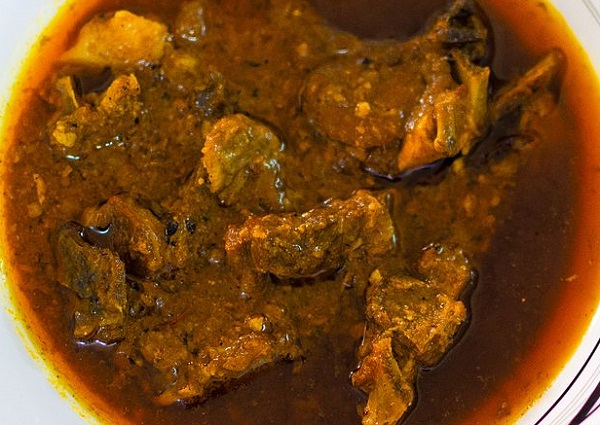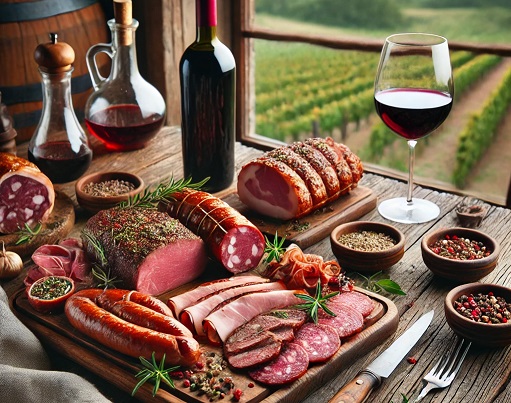Wine Pairing
Indian Lamb Rogan Josh

Indian Lamb Rogan Josh is a curry dish of the Kashmiri Cuisine.
Rogan means "clarified butter" or "red", while josh means "hot" or "stew".
Pairing Suggestions
If Mild:
Dry Riesling (Germany)
Sparkling Rosé (World)
If Spicy:
Riesling Spätlese (Germany)
Pinot Gris (France)
Gewürztraminer (France)
Red Wines:
Merlot (World)
Right Bank (France)
Châteauneuf-du-Pape (France)
Sparkling Syrah (World)
Garnacha (Spain)
Pinot Noir(USA)
Cabernet Franc (France)
Description
Thick, aromatic and spicy red sauce, meets tender lamb stew: the perfect match is a medium-bodied Merlot.
Why? Merlot is fruity and not too tannic, acidic, bodied or alcoholic. Perfectly balanced for our curry lamb stew.
Merlot has a touch of sweetness that comes from fruit ripeness and can be served slightly chilled 14-15°C (57-59°F).
Many of the wines we recommend can be served cool, to contrast the heat of the stew.
The contact with oak barrels releases into the wine an aroma-compound called "eugenol" found also in Indian Curries spices such clove, allspice, nutmeg, cinnamon, etc.
An oaked wine will create a "complementary" match.
About Indian Lamb Rogan Josh
The name Rogan Josh is Persian but the dish is Kashmiri and influenced by different civilizations (Moghuls).
Traditionally made with red meat such lamb, mutton or goat, the recipe and techniques vary, influenced by ethnicity.
Basic Interactions
Sauce is the key. Forget red wine with red meat. Sauce and seasoning decide!
Want to cool down? A chilled aromatic white such Riesling, Gewurztraminer, Gruner Veltliner or Torrontes reduce heat.
Want to feel the heat? Go for oaky white such a New World Chardonnay or a spicy red such GSM, Shiraz, Valpolicella, Mencia.
Acidity makes your mouth water. This helps against the heat.
Sugar coats your mouth. It is a barrier to defend your taste buds, protecting them.
Alcohol sets your mouth on fire. It intensifies the heat perception especially of ginger, turmeric and red chilli.
Tannins clash with spices. They enhance the perception of bitterness and heat.
General Rules for Indian Food + Wine
- Avoid very dry wines.
- Sweetness calms the heat, while tannins amplify it.
- Rule of thumb: the spicier the dish, the sweeter the wine.
- Avoid harsh, bitter tannins and go for smooth, velvety and ripe ones.
- Match the strenght! Don't choose a light wine to match your Vindaloo, it will disappear!
- Fruity, aromatic wines love spices. The fruitier the better.
- Forget those big Napa Cabs with Indian Food!
- Don’t bite into that green cardamom or clove while sipping your wine.
- Rosé wines are often a winner. Especially if they are sparkling.
Curry loves Wine
If the dish is very creamy, go for a creamy (malolactic) Chardonnay.
If the dish is spicy, go for something off-dry: Riesling Spätlese, Pinot Gris, Gewürztraminer.
If you go for red, go for something fruity: Pinot Noir, Gamay, Garnacha, GSM blends, Valpolicella.
In the mood for a bold red? Look for mature, round tannins: Syrah.
Indian Sauces
3 colors sauces:
| Sauce | Color |
|---|---|
| Green Sauce: Herbal Sparkling Wines, Sauvignon Blanc | |
| Red Sauce: Acidic Sparkling Rosé, GSM Blends, Gamay | |
| Red Creamy Sauce: Buttery Tomato Full Body Rosé, Lambrusco, Syrah |
Go Local if You Can

Let local wines complement the flavors of local food
Pairing local wine with local food will enhance the dining experience by harmonizing the characteristics of the wine with the ingredients and cooking styles of the region:
Terroir
The environmental factors, soil, climate, and topography, that influence the characteristics of a wine, represent the Wine Terroir of a region. The ingredients, flavors, and cooking techniques represent the Cuisine Terroir.
Culture and Tradition
Local wines are deeply intertwined with the culture and traditions of a region. Pairing them with local cuisine creates an authentic culinary experience. For example, if a region is known for its hearty, red meat dishes, a robust and full-bodied red wine from the region will enhance the dining experience.
Ask for Help
Let local chefs and winemakers collaborate to create innovative pairings that showcase the best of the region.
A good rule of thumb is to match the intensity of the wine with the richness of the meat for the best pairing experience.
Examples
Pairing Italian Chianti with traditional Tuscan dishes like Pasta with Ragu or Beef Fiorentina.
Enjoy a Red Burgundy with classic French dishes like coq au vin or boeuf Bourguignon.
Matching Spanish Rioja with Paella or Tempranillo with Tapas.
Alcohol can be addictive. Always drink in moderation.
© Copyright 2015-2025 W3 Wine School. All Rights Reserved.